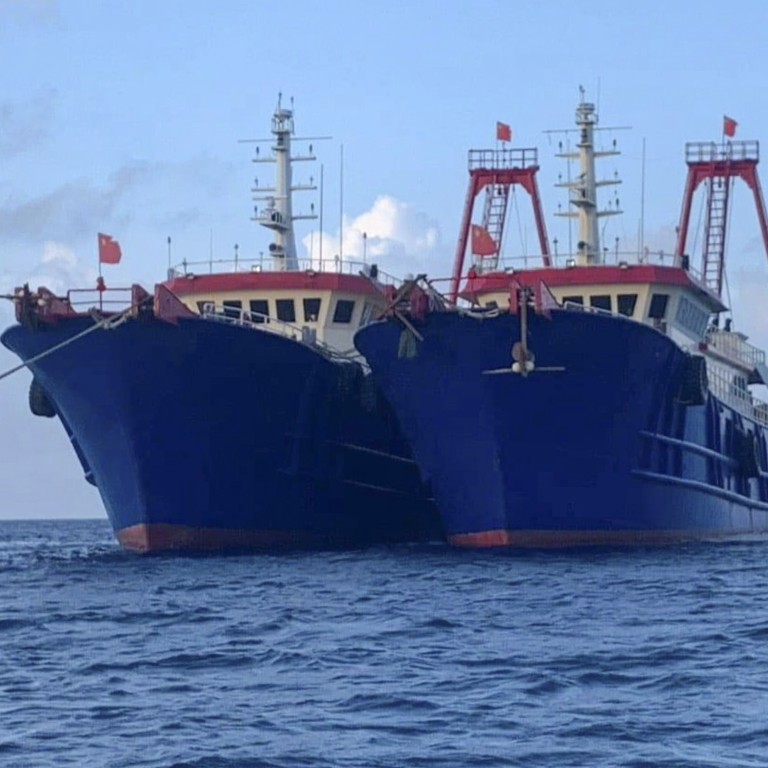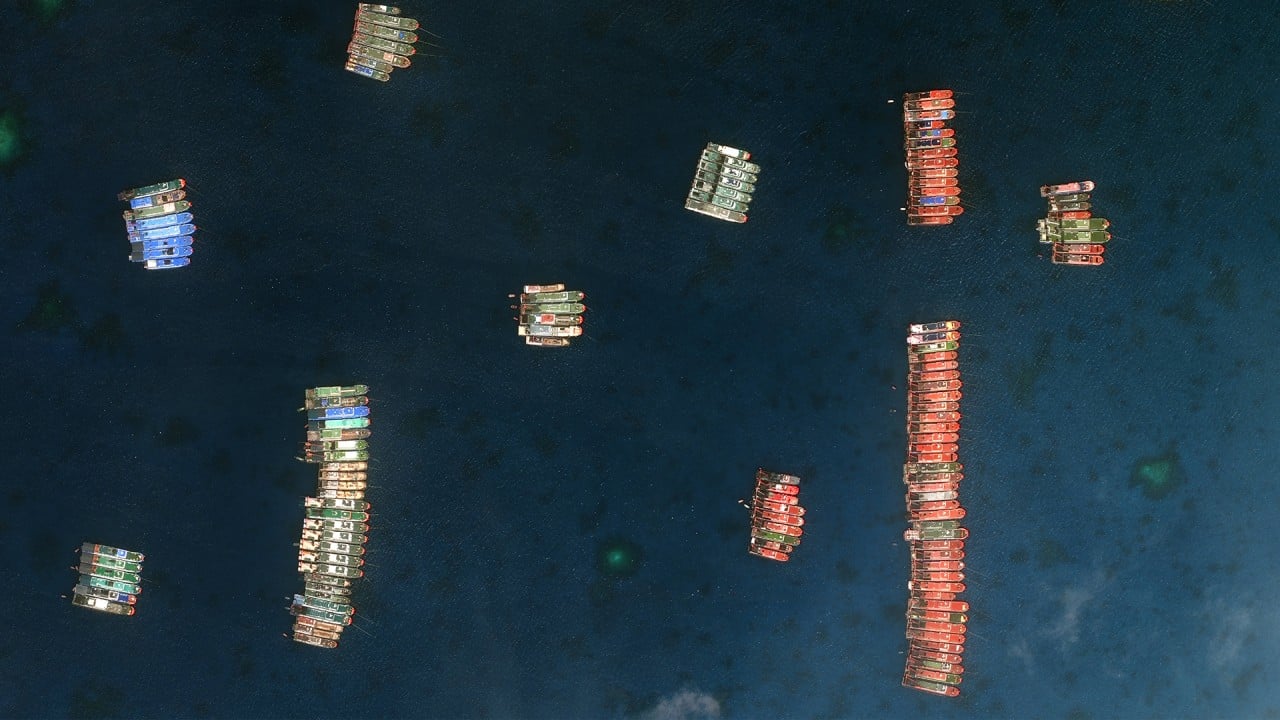
Philippines keeps its options open amid bid to defuse Whitsun Reef row with China
- Even as Manila and Beijing engage in diplomatic discussions, the Philippine defence and foreign affairs departments say they are keeping their options open
- While one official floated the possibility of expelling a Chinese envoy, observers say diplomacy is key to resolving the row without either side ‘losing face’
Tensions over the Whitsun Reef in the Spratly Islands, which both China and the Philippines claim, have heightened in the past month after more than 200 Chinese boats were spotted in waters within Manila’s exclusive economic zone (EEZ).
Manila said the boats were part of Beijing’s maritime militia. China denied this, insisting the vessels were merely seeking shelter from bad weather.
While many of the boats have now spread out across the Spratlys, Manila and Beijing have continued firing broadsides at each other, with the Philippines vowing to file diplomatic protests daily as long as the vessels remained in its EEZ.
Spratly Islands, Diaoyu, Bay of Bengal: is a storm brewing in Asia-Pacific waters?
Philippine defence department spokesman Arsenio Andolong on Thursday said: “As the situation evolves, we’re keeping all our options open in managing the situation, including leveraging our partnerships with other nations such as the United States.”
Washington has said that any armed attack against the Philippines military or public vessels would trigger US obligations under the US-Philippines Mutual Defence Treaty.
The dispute has sparked a war of words between Beijing and Manila over the past week.
On Monday, the Department of Foreign Affairs (DFA) lashed back at a Chinese embassy spokesperson in Manila who had earlier in the day criticised Defence Secretary Delfin Lorenzana for disputing Beijing’s explanation that the vessels were sheltering from bad weather since there had been no storms.
The unidentified Chinese spokesperson also said: “We hope that authorities concerned would make constructive efforts and avoid any unprofessional remarks which may further fan irrational emotions.”
The DFA said it deplored the spokesperson’s remarks and warned that “as guests of the government, embassy officials should “observe protocol and accord respect to Philippine government officials”.
Later that day, the DFA’s strategic communications executive director Ivy Banzon-Abalos told reporters that in such cases, expulsion of the spokesperson would normally be “part of the range of diplomatic courses of action”, but she could not confirm if this would indeed happen.
Japan’s Suga expected to visit Philippines, India after Biden meeting
On Wednesday, Chinese foreign ministry spokesperson Zhao Lijian accused Manila of pushing a “wanton hype-up” of the situation and insisted Beijing had no plans to maintain a “permanent presence” near the reef, prompting a sharply-worded response by Philippine Foreign Secretary Teodoro Locsin Jnr on Twitter.
“Then tell them to move out. All of them. If they’re really fishing, the fish are all gone; they’re just fouling the water with waste,” he wrote. “Nobody fishes by lashing ships together. Last time that was done was the Persian invasion of Greece recorded by Herodotus. We’ve seen the movie.”
On Thursday, a government official with knowledge of the events, who spoke on condition of anonymity, said bilateral conversations were taking place.
“The Philippine response will be calibrated. Various options are being considered, and discussions [with China] via diplomatic channels are going on,” he said. The discussions included “Chinese ships to withdraw or diminish in the near future”.
The official declined to confirm whether expulsion of a Chinese diplomat was among the options being considered.

PAST LESSONS
Former Supreme Court Justice Antonio Carpio, a China critic, suggested Manila should not be so quick to trust Beijing.
Carpio said when he was the legal counsel to former president Fidel Ramos in 1995, Chinese vessels had started massing near Mischief Reef, east of the Spratly Islands. “The Chinese said to President Ramos they were only building fishermen’s shelters.”
The crude structures, however, were replaced by a military installation. At that time, Manila could not seek Washington’s help since relations were at an all-time low after the Philippines forced the US military to leave the Subic Bay naval base and Clark Air Base in 1992.
US backs Philippines in stand-off over South China Sea reef
The next actions of the Ramos administration led to discussions that resulted in an agreement between Asean and China on behaviour in the South China Sea, Carpio said.
“The Philippine Navy brought foreign and local journalists to Mischief Reef on a rickety boat that conked out for a while,” Carpio said.
“The issue was internationalised. Asean initiated a dialogue with China which resulted in the 2002 Declaration of Conduct between Asean and China,” he said. “Under the Declaration of Conduct (DOC), parties should not inhabit uninhabited features in the South China Sea … if China builds on Scarborough Shoal, Sandy Cay or Julian Felipe Reef, it will violate the DOC.”
The South China Sea and the proposed Code of Conduct were among the topics discussed by Locsin and Chinese Foreign Minister Wang Yi when they met last week in Fujian province.
Locsin had tweeted afterwards that they had a “fabulous meet” lasting three hours, in which they discussed issues critical to the Philippines, China and the US.
“How to work well all 3 together. What’s needed is time well spent soberly sans bickering,” he said in his Twitter post.
Public statements of both sides may have gone too far to retract without losing face
Former Philippine envoy to the United Nations Lauro Baja said that while President Rodrigo Duterte had not confronted China publicly on the issue, he was likely to be facing pressure from the military or defence establishment.
Duterte’s government has since 2016 been nurturing close ties with Beijing.
“Public statements of both sides may have gone too far to retract without losing face,” said Baja, who recommended “backchannel diplomacy” and the exploration of ideas with Chinese officials “on how to resolve the impasse without losing face”.
If Manila expelled a Chinese diplomat, “China will retaliate”, he said. “If China expels, are we prepared to do another expulsion?”
As South China Sea row deepens, is Duterte losing his ‘love’ for Beijing?
Baja recalled an incident in 2002, when the justice secretary at the time, Hernando Perez, publicly called for the expulsion of a Chinese envoy after a heated argument.
Chinese ambassador Wang Chunggui had gone to Perez’s office to demand he release 122 Chinese fishermen without giving them fines or putting them on trial for poaching in Tubbataha Reef in the Philippines’ Sulu Sea.
When Perez refused, Wang removed his shoe and pounded his desk with it. Gloria Macapagal-Arroyo, the president at the time, summoned Baja from Copenhagen, where he was attending an Asean meeting in his capacity as acting foreign secretary.
Baja said he was able to persuade Perez to “redo his demand” and agree to a letter of apology – which Baja drafted for Wang and Beijing approved.
The fishermen were ultimately released after paying a US$50,000 fine and their six vessels were confiscated.
In the present dispute, Baja said: “I hope and it is a glimmer of hope the Chinese vessels will quietly withdraw and things will simmer down.”


